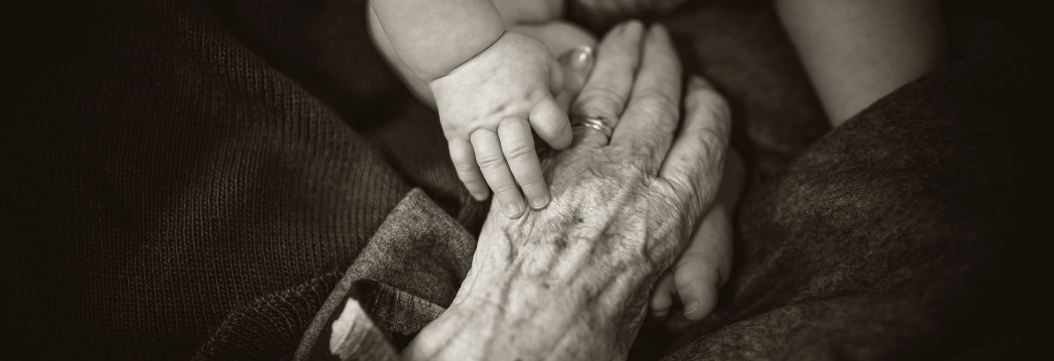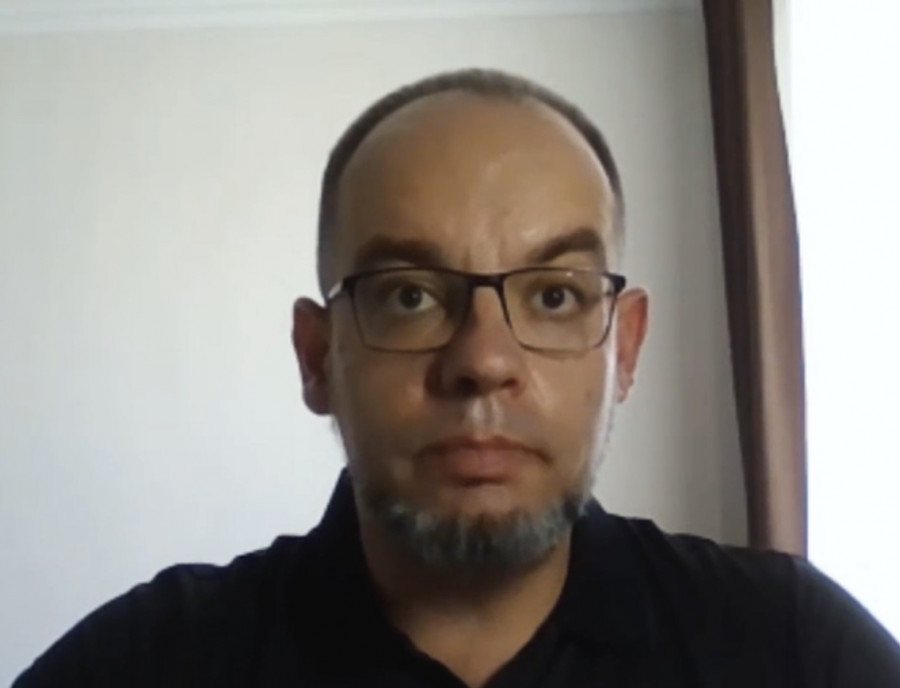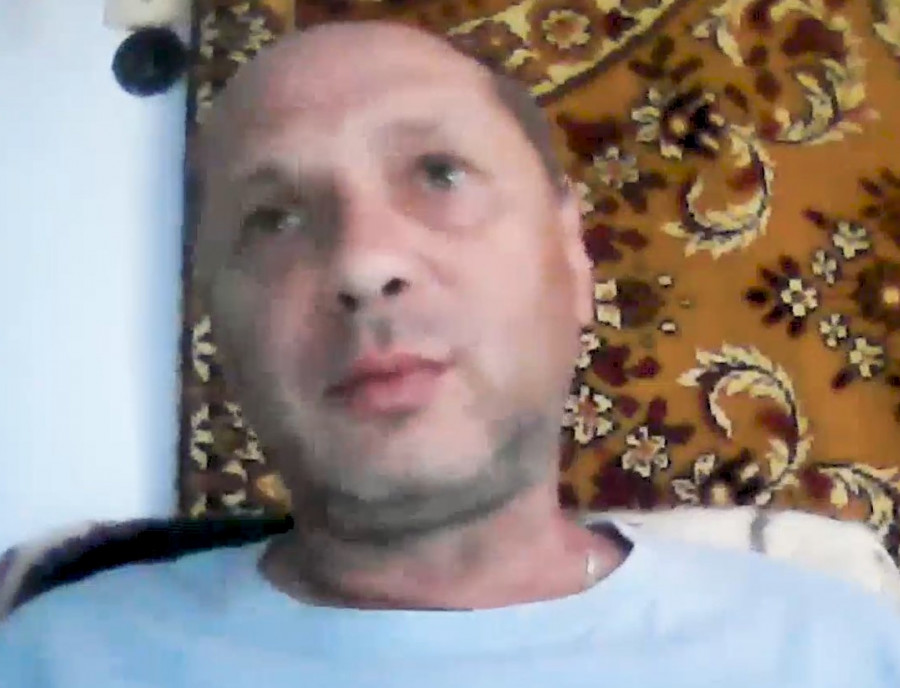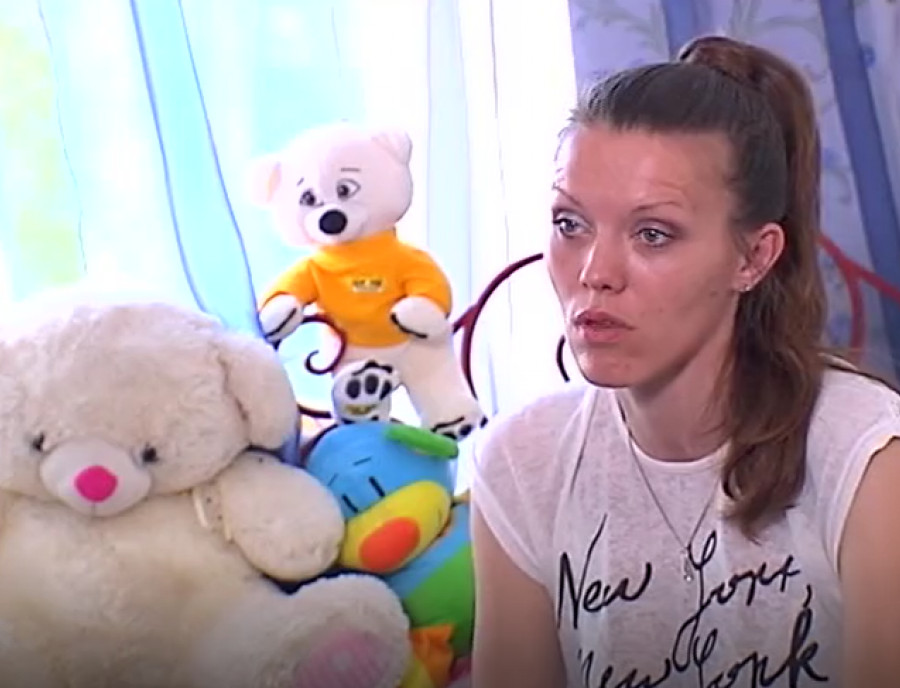For more than a month after the outbreak of the full-scale war, the orthopaedic traumatologist Serhiy Mudryi saved people’s lives in besieged Mariupol, left without the electricity, water, and heat. An endless stream of wounded patients coming every day, and amputations done every day... A bomb was dropped on the house where Serhiy’s family was hiding from shelling. People miraculously managed to escape. They left the city under shelling, when it was no longer possible to perform surgical operations, and every minute of their lives could be the last one.
The war came to us on 24 February. It all started in the morning, both throughout the country and here in Mariupol. I was still at home at that time. Early in the morning, I got a call from my work. I work… I worked in municipal hospital no. 1 as a traumatology doctor. At that time, I was acting head of the traumatology department, since the department head, Lev Afanasyev, was on leave.
In the morning, one or two missiles landed in the left-bank part of the city, where I live, in the Left Bank district. One missile flew into the private houses’ area, hitting a residential building, where a woman of gypsy nationality was injured. Another missile hit a public transport stop, where a man was, and he was injured too. The wounds of the woman and the man were like gunshot wounds. The wound of the lower leg was damage to the neurovascular bundles. I was called to work, and the [ambulance] crew was on duty. When I came, the patients were already stabilized and ready for surgical intervention. The first two days, on 24 and 25 February, I was at work. Then I went home to have some rest.
On Friday, a missile hit the district where I live. A school building was blown up. A residential building located next to that school was damaged. I went to work again, because many casualties were expected, but it did not happen.
There were two victims, who were admitted to the local hospital in the district. We realized that it was no longer safe to be in the district where I live, so we moved a little closer. We lived on the outskirts, the eastern outskirts of our micro-district, from where the attack of the so-called “DPR” troops was supposed to advance. We realized that for safety reasons we needed to move to the centre of our district, where we lived. It was Sunday. And on Monday, 28 February, I left for work. At that time, our work schedule was such that we had to be on a duty shift for two days in order not to go home and back to work every day.
I left for work on 28 February, leaving my family in a new place. And basically, everything started on 28 February. Shelling began throughout the city, including the neighbourhood where I worked. I worked in hospital no. 1. It was located near Ilyich Steel Works, which was one of the military bases of the Ukrainian Armed Forces. One large base was at Azovstal plant, and another large base was at Ilyich Steel Works. This plant was literally 50 metres from our hospital. That is, our hospital was on the demarcation line. We stayed in this mode almost until April, while the offensive of the “DPR” troops on Ilyich steel plant continued. The shelling attacks were incessant. The private houses’ area, the residential sector, and all the high-rise buildings that were in the battle zone suffered, including our hospital.
Residential buildings were being destroyed. People fled in panic to the hospital, because they thought that the hospital was not on the list of targets, and no one would touch it, and the hospital would not be shelled. However, unfortunately, the first incoming strikes and attacks on the hospital began soon.
During the first week, we received patients with mine-caused and blast-related wounds, and then we received people left without water, without electricity, and without heat. In search of water, in order to cook something to eat, families took to the streets. Someone went out for water, and someone kindled a fire, as they were going to cook some food. At that time, mines flew in, shells hit, and rockets fired – and people received injuries of varying severity. Accordingly, those victims were brought to us.
On 1-2 March, some local ambulances were still running, but then the ambulances stopped coming, and people brought the wounded in their own vehicles. We worked in this mode non-stop, almost from the morning to the evening. I must say that of all the doctors, only my colleague Serhiy Rusanov and I remained in the hospital. We didn’t have any other doctors left, for various reasons. There were very few paramedical staff members and junior medical staff too. An operating team we then had included operating nurse Nadiya Mykolaivna, nurse Olena Ryabovolova, and my colleague Serhiy Rusanov. We operated on, bandaged, and nursed almost all trauma patients with the number of staff we had.
My family stayed in another district, and there was no telephone connection. I did not know what was happening to them. Although, according to some rumours, I knew that their district was under shelling attacks too.
There was shelling and bombing there. I could not go there, because the area or the road, along which I would go to my family, was shot through. It was under fire. In the end, I couldn’t put up with it. A week later, I… The car was at hand, and I realized that I had to go, come what may. Uncertainty was gnawing at me, and it was hard to put up with it.
I got into the car and, indeed, I drove there. I was not caught by fire, although I saw the fighting taking place in the neighbourhood I drove through. I drove to the house where my family was supposed to be. I saw some destruction there – a missile stroke just three hours before my arrival. Some rockets or mines flew in there, but they were not injured. They just grabbed their things in a state of shock. There was another hospital nearby, where I used to work, literally across the street from this house. So my family members took shelter there. With their things in their hands, my mother-in-law, my wife, and my son, an eleventh-grade student, ran across the street and took refuge there. I came and met some residents of the house. They eased my anxiety, saying that everything was fine with my family, and that they went to the hospital. I quickly got in the car and came to that hospital. I found them in the admission department, put them in the car, and we came back. Well, the family re-united, re-assembled, and we came to my hospital.
Literally five days after we arrived, after I brought my family, a rocket hit our hospital and destroyed the first floor of the surgical department. The operating room, where our surgeons performed operations, was damaged and went completely out of order. The explosion knocked the operating room out of service.
The first floor was damaged, and surgical profile patients could not be there. They moved over to us, to the ground floor. So, day after day, there were incoming shelling attacks and new patients kept coming. The number of patients in our department alone was over 50 people. There was no electricity in the department, and we could not provide medical aid in full, as in order to understand what kind of injury a person had, an x-ray scanning was needed.
We could not do this because there was no electricity and there were no laboratory assistants. Theoretically, one could take a scan. For that purpose, it was necessary to start up the power generator and burn a large amount of diesel fuel in order to see an x-ray scan. Even without that, it was clear to us that this was a fracture, or a severe fracture. Large metal fragments turned the limb into mincemeat. It was a mess of muscles, blood vessels, nerves, and small bones.
At first, all this was visually clear: fragments and deformation. People could not move their hands, could not stand on their feet, and it was clear that this was a severe open fracture. At first, we had a supply of external fixation devices. We washed the wounds and applied those external fixation devices. Then, in two weeks, we ran out of those devices.
We did not have the possibility to fully bandage our patients every day, because there was only one nurse, and I was the only doctor. Two weeks later, I was left alone. We began to understand that with such tactics there would be many complications in any process and amputations would be needed. It was problematic to do an amputation at that time, because there were no medical staff, and there was no anaesthesiologist. We had only one anaesthesiologist left, who struggled to be able to cater for the needs of both the surgeons and us.
The first moment that etched in my memory was about a young couple. They were from Donetsk. They decided to officially register their marriage before the war, as they were going to become young parents. They came to Mariupol and registered their marriage. The woman… They rented a flat in Mariupol, and she found a job there. They decided that their child would be born in Mariupol, on Ukrainian land, in order to receive a normal birth certificate in Ukraine. It was literally before the war. She was nine months pregnant at that time. Then the hostilities began. They lived in Illichivskyi district, in Kalmiuskyi district, and hiding from the shelling (the shelling started there in early March), they took shelter in the newly re-built, renovated Neptune swimming pool. There is one in Mariupol... There was one.
There was such a pool in Mariupol. They took shelter there, but it is obvious that the pool is not a perfect place, not the most ideal shelter. And one day a bomb or a rocket hit there. The building collapsed, and this woman was buried under the slabs. She was taken out from under the rubble. She was squeezed by a slab and got a crushed multiple fracture of her thigh. She got a comminuted fracture and a compression syndrome. She was brought, probably a day after that building collapsed. And it was clear that an amputation had to be made.
We did the amputation, and literally 3-4 hours later, she began having contractions. She gave birth to a stillborn child.
This woman was taken to an obstetrician-gynaecologist, who performed a manual separation of the placenta. She was returned to our department then. They did not have a car. He tried to find some transport carrier, but no one wanted to go. Eventually, he found out some route, how to get out. He was told how to get out of this area to a safer place, and where to get out. He took a sitting medical gurney, put his wounded wife on it, and they left for the unknown. I don’t know how their path ended. God willing, everything was fine with them, and they got out of this hell. There was a residential block nearby. There was a residential building, and a mother and her 12-year-old son. They went outside to cook something on a fire, and a rocket hit. The boy’s leg was torn off, and his mum had some minor injuries. They were brought to us too. We did not have children among our patients, but I operated on this boy and did an amputation.
It was like an epidemic of amputations, you know. Since such injuries, such wounds, led to the fact that the limbs had to be... Three or four amputations a day: on a thigh, lower leg, shoulder, forearm, and hand. I was left alone.
My colleague-doctor left, as he was saving his family. He drove to the downtown area and saw his children, who were in a safe place in the city centre, where the Drama Theatre was located. By that time, a bomb had already hit the Drama Theatre. In the neighbourhood, a little further near the cathedral, there were 9-storey residential buildings. They were already on fire, burning. He came just at the time when those 9-storey buildings were on fire. He miraculously managed to take his children and his wife out. He took them closer there, to the residential block, where our hospital was located. He said that he was going to save his family. “I’m leaving tomorrow”. His decision was absolutely correct, I think.
Then, only three doctors, including myself, remained for the entire hospital. Well, let’s say, four doctors. There was a surgeon with his son, an anaesthesiologist, and I. Then, on 29 March, our anaesthesiologist was wounded very badly in the gluteal region, and had a large blood loss. He was also in charge of the haemodialysis department. We saved him. It was impossible to stay in the surgical department’s building any more. It was targeted and attacked by tank fire. Saving our colleague, we moved him to the basement, or rather not to the basement, but to the department of neurology and urology. Then, on the next day, this department came under fire from Grad MLRS. All the windows and window frames were blown out. On the ground floor, we could stay only in the hallway. By that time, we had moved our patients from the urology department into the hallway. Again, massive shelling of this building by Grad MLRS rockets happened. At that time, we already hid our colleague, together with his family, and some department’s staff members in the basement. The basement was well-equipped.
We stayed in this basement until 6 April, taking care of our colleague. There was simply no hope that we would be saved. Since we realized that planes were flying above us. They were bombing us, Grad MLRSs were shelling, and tanks were firing.
On 29 March, there was a situation… As I said, Ilyich Steel Works served as the base of the Ukrainian Armed Forces. They had a bunker, a bomb shelter there, and the Armed Forces soldiers and border guards were staying there. They had many civilians there too, who also hid from shelling there. Among them... There were some doctors, military doctors. There was a pregnant woman who was also about to give birth to a child. The military brought her from the bunker to us, while our team included only a surgeon, an anaesthesiologist, a traumatologist, and me.
Secondly, our hospital building was under constant shelling. It was under shellfire all the time, and the planes bombarded the area. To deliver a baby in those conditions? We refused them. They left us the woman and drove off. The anaesthesiologist decides that she was not safe there. On the one hand, it was physically unsafe, and on the other hand, no one would be able to provide skilled assistance to her. He again put her in the car and took her back there, to the bunker. And he received some gunshot wounds. A bullet wound to the gluteal region, and nearly losing his consciousness, he managed to get back to the hospital building. He crashed the car, as he passed out. He was found just by a miracle.
There was nobody close to the building, as everyone was staying in the basements. Then people saw him coming – it was already getting dark then. It was closer to the evening. They pulled him out of the car. He lost a lot of blood. He had a wound in the gluteal region. We turned on the power generator. We had the possibility to start up the generator. We turned it on and, basically, performed an operation. We performed it in those conditions that we could ensure. We only made a tamponade of the wound, and washed the wound. We stopped the bleeding, and made him an intraosseous transfusion.
Then there was a need for a direct blood transfusion, because the blood pressure was falling. Since it was dropping, only a blood transfusion was necessary. We did not have any blood in stock. There was no donor blood at all.
I called the staff from his department and their family members. We found two guys who were our planned donors. We took their blood samples to identify the blood group and examined the donors. We took blood from one of these guys and did a blood transfusion. Thanks to this, we saved our colleague. Our mornings began with shelling, starting at 4 o’clock and lasting until 10 o’clock in the morning, when everything calmed down. We thought the war was finally over. However, at one o’clock in the morning, we heard the roaring of an aircraft. The planes were flying and the bombing began. Then, at around two or three o’clock in the morning, a bomb fell. They were somewhere out there. The earth was shaking, shuddering, and you understand that the next bomb can hit into the building where you are, under which you are. Everyone would be buried under the rubble then. There would be nobody to dig us out. There was no telephone connection. Nobody would recognize you. You would be just buried alive in this group grave. In the end, when the “DPR” soldiers came to the territory of the hospital later, they began to occupy the buildings and found out that there were people in the basements. They began... The idea of rescuing those people did not come to their minds, but in the end, they took pity and one evening they came to the basement and said, “There will be an evacuation tomorrow”.
They fired from Grad MLRSs, from every sort of weapons, including mortars and tanks. Grad MLRS rockets were flying, and under that shelling, we got out of one basement to go to another one. From that basement, we came out in order to get to a certain point where buses were waiting for us.
Those buses took us to a suburban village called Sartana, a settlement, basically. We were evacuated there. We had to go through the so-called filtering procedure. As we were told, they would bring us to the camp, and we would be staying there. They would take your fingerprints and talk to you. Define your... who you are, and what you are. There was no telephone connection there either. Yet, it so happened that we still turned on the phones and got through to our friends or family members. We contacted our son’s godmother. She had already left Mariupol by that time, but she gave us the phone number of a transport carrier who was located in another centre.
And he… We contacted him. We contacted him and asked him to take us from Sartana by some roundabout ways that he knew, by some paths, to Berdiansk, which was occupied at that time. We went to Berdiansk with my family and planned to travel further to Ukraine. I contacted our son. My son found us a place in a house in Zalishchyky town of Ternopil region. We planned to leave Berdiansk, to make our way through Zaporizhzhia further, to other part of Ukraine. We even found a carrier. The carrier was supposed to take us to Zaporizhzhia. On the morning of 12 April, we came to the site from which evacuation transport departed in Berdiansk, but the carriers refused to go because the fighting intensified.
There was Vasylivka settlement, which was sort of a demarcation point, known to everyone. He said that he would not go there, and no one would go from Berdiansk.
We found another carrier by phone, but all the carriers refused to go. On Facebook, we found a carrier who was ready to take us from the Crimea through Russia to Poland, and then to enter Ukraine from Poland’s side. This route was safe. For three days, we travelled through all of Russia, and reached the Latvian border. At the border, we spent about a day, probably. We stood there waiting. The Russian side did not pass people quickly. In the meantime, I had already contacted my niece. She left Kyiv in early March. They left for Romania, and then from Romania they ended up in Poland. Having learned that we were going to Poland, to Ukraine through Poland, she contacted some Polish volunteers, and they found a temporary place for us, a shelter near Warsaw.
Then some videos from our city started to appear on the Internet. Certainly, we had no idea about what was happening in the city at all. We then saw this horror and realized that the city was almost wiped off the face of the earth. We saw our destroyed and burned down flats, and we saw our destroyed hospital, as well as other hospitals in the city that were destroyed too.
When quoting a story, a reference to the source – the Museum of Civilian Voices of the Rinat Akhmetov Foundation – is mandatory, as follows:
The Museum of Civilian Voices of the Rinat Akhmetov Foundation https://civilvoicesmuseum.org/






